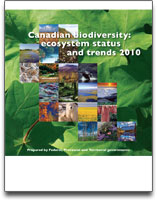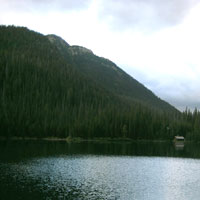
News |
- Illegal Decisions Rest with Manitoba Conservation
- Tigers are Ggggrreeaat! But Going Extinct!
- Unelected Senators Used to Overrule Parliament
- Federal Court Quashes NWT Mining Permit
- Californians Keep Climate Law
- Oxfam Pushes for International Environment Court
- Canada Signs UNDRIP... Well Sorta
- Climate Change in the Courts
- Canadian Biodiversity Report Identifies Ecosystem Risks
- G20 Promise: End Subsidies to Oil and Gas Companies
- Scrutiny of Toronto's G20 Meeting Continues
- Prosperity Mine Denied
| Illegal Decisions Rest with Manitoba Conservation | 27 November 10 |
 The Environmental Assessment and Licensing Branch (EALB) in Manitoba Conservation is dealing with an illegally constructed boat access channel located in the Beaconia Lagoon on the east side of Lake Winnipeg.
The Environmental Assessment and Licensing Branch (EALB) in Manitoba Conservation is dealing with an illegally constructed boat access channel located in the Beaconia Lagoon on the east side of Lake Winnipeg.The channel was constructed between December 2009 and February 2010 without a license as required through Manitoba’s Environment Act. It affects crown lands and waters, and was constructed by a private land owner. Concern about the environmental impacts of the project as well as the retroactive nature of the permitting, with no apparent consequences, caused serious concerns among local residents and others. The local residents lodged complaints and banded together to form the Eastern Beaches Conservation Coalition (EBCC). Following these complaints Manitoba Water Stewardship issued a stop work order on the project in March of 2010 until an Environmental Assessment could be completed. An Environment Act Proposal was filed in late October and comments were accepted until November 22, 2010. Manitoba Wildlands, and numerous others, submitted comments asking EALB: "...not to license this project, and to issue an order for remediation and restoration of the lagoon." View online public registry file #5486.00View October 27, 2010 Manitoba Wildlands news item View November 19, 2010 Manitoba Wildlands Comments Letter (PDF) View more information on Manitoba Wildlands Land Use Planning page View Eastern Beaches Conservation Coalition website Source: EALB, Manitoba Wildlands |
|
 Print version Print version |
Top |
| Tigers are Ggggrreeaat! But Going Extinct! | 27 November 10 |
 The world's first tiger summit has ended with donor pledges of almost $US330 million to protect Tiger populations which have plummeted by 97% percent during the past century. It is estimated that as few as 3,000 wild tigers survive in a few scattered pockets of habitat in Asia.
The world's first tiger summit has ended with donor pledges of almost $US330 million to protect Tiger populations which have plummeted by 97% percent during the past century. It is estimated that as few as 3,000 wild tigers survive in a few scattered pockets of habitat in Asia."The tiger has made the world realize that there is a crisis in nature taking place. Our development philosophy needs to find a balance between the economy and nature," said Keshav Varma, director of the Global Tiger Initiative at the World Bank. The high-profile conservation conference called by Russian Prime Minister Vladimir Putin and World Bank chief Robert Zoellick mobilized political, financial and celebrity support to double the number of wild tigers by 2022. "This summit has created the high-level government backing that we needed to create a platform to immediately reverse the decline of wild tigers, which is threatening them with extinction," said Michael Baltzer, head of WWF's Tigers Alive initiative. But the summit ended with concerns remaining about financing and concrete action. Several states are skeptical that the World Bank – which has funded many hydropower and other infrastructure projects that have eroded tiger habitats – has genuinely changed its spots. "Overall, this summit has been positive for tigers, but it won't stop poaching and trafficking because they haven't put in place a mechanism to support enforcement," said Steven Galster, director of Freeland, an organisation that helps to train wildlife authorities in south-east Asia. "They spent $1.4m on this meeting. Why not spend $7m to set up an emergency fund to support enforcement?" View November 19, 2010 The Globe and Mail articleView November 23, 2010 Global Tiger Summit speech (PDF) View November 23, 2010 Associated Press article View November 24, 2010 Guardian article View November 24, 2010 Mongabay.com article View November 24, 2010 PR Newswire article View November 24, 2010 AFP article View November 26, 2010 The Age article View The Tiger Summit information page View Save Tigers Now webpage View Tenth Meeting of the Conference of the Parties to the Convention on Biological Diversity Source: Guardian |
|
 Print version Print version |
Top |
| Unelected Senators Used to Overrule Parliament | 27 November 10 |
 The Canadian Senate voted down Bill C-311 "Climate Change Accountability Act" November 16, 2010, with 43 opposed and 32 in favour. The private member's bill was passed by Parliament in May 2010 with support of all three opposition parties: NDP, Bloc, and Liberal. The vote was called for by government Senators on 50 minutes notice and with no debate.
The Canadian Senate voted down Bill C-311 "Climate Change Accountability Act" November 16, 2010, with 43 opposed and 32 in favour. The private member's bill was passed by Parliament in May 2010 with support of all three opposition parties: NDP, Bloc, and Liberal. The vote was called for by government Senators on 50 minutes notice and with no debate.The Leader of the Opposition in the Senate, Hon. James S. Cowan, stood up the following day and declared: "Yesterday, this government thumbed its nose at the House of Commons and at Canadians from coast to coast to coast who care deeply about climate change, arguably the most important issue facing Canada and the world. Yesterday, this government refused to allow a bill that came to us with the support of a majority of the elected members of the other place to proceed even to committee, where it could receive careful scrutiny and allow Canadians to be heard on the merits of the bill." If passed the bill would have required the federal government to set regulations and establish targets to bring greenhouse gas emissions 25 per cent below 1990 levels by 2020, and to set a long-term target to bring emissions 80 per cent below 1990 levels by 2050. "Stephen Harper has done what he always promised never to do: use unelected officials to counter the will of Parliament and the Canadian public." Said Graham Saul, executive director of Climate Action Network Canada. An online poll by CBC determined that 86.54% of respondents felt the Senate defeat of Bill C-311 was an abuse of democracy. View Bill C-311 "Climate Change Accountability Act"View November 16, 2010 Hansard Senate Debates View November 17, 2010 Hansard Senate Debates View November 17, 2010 Climate Action Network Canada statement View November 17, 2010 The Globe and Mail article View November 17, 2010 CBC News Question of the Day View November 17, 2010 Toronto Sun article View November 19, 2010 Toronto Star article Source: Debates of the Senate of Canada (Hansard) |
|
 Print version Print version |
Top |
| Federal Court Quashes NWT Mining Permit | 27 November 10 |
 In a November 12, 2010 decision Canada's Federal Court quashed a mining company's permit to explore on the traditional lands of two Northwest Territories First Nations. The court concluded the First nations had not been properly consulted.
In a November 12, 2010 decision Canada's Federal Court quashed a mining company's permit to explore on the traditional lands of two Northwest Territories First Nations. The court concluded the First nations had not been properly consulted.Two Akaitcho First Nations have concerns that the Vancouver-based company's bid to drill for lithium at its Phoenix site near Aylmer Lake, about 340 kilometres northeast of Yellowknife, could disturb their ancestral burial grounds. The Mackenzie Valley Land and Water Board issued the land-use permit to North Arrow on July 16, 2009, but First Nation officials said they had not been consulted before the permit was awarded. "There were no face-to-face meetings with chiefs on issues; no real meetings with the communities and no attempt to address any of the communities' or leaders' ideas into North Arrow's proposal. North Arrow simply refused to negotiate," stated Justice Michael L. Phelan in his decision. "This decision sends a clear message to companies who want to operate in Akaitcho Dene territory. This is our land. We are open to working with industry, but companies need to respect us, respect our rights, and respect what we have to say. We have to ensure that our treaty rights and our land and environment are protected," explained Yellowknives Dene Chief Edward Sangris. View November 12, 2010 Canadian Federal Court DecisionView November 16, 2010 CBC News article View November 17, 2010 HQYellowknife.com article View November 18, 2010 Mining News article View November 23, 2010 Canadian Mining Journal press release View more information on Manitoba Wildlands Aboriginal Court Cases & Consultations page Source: Dene v. Canada, CBC News |
|
 Print version Print version |
Top |
| Californians Keep Climate Law | 20 November 10 |
 In the United States mid-term election on November 2, 2010 California voters defeated Proposition 23, and most members of Congress who helped pass California's clean energy and climate legislation in 2009 kept their seats.
In the United States mid-term election on November 2, 2010 California voters defeated Proposition 23, and most members of Congress who helped pass California's clean energy and climate legislation in 2009 kept their seats.Climate change was front-and-center in California. Regardless of partisan stripe the state's voters overwhelmingly rejected Proposition 23, an oil industry backed ballot initiative, which aimed to repeal California's climate law. In the midst of an economic slump, Californians are seeing the benefits of a low carbon future. Green jobs in California have grown 10 times faster than the statewide average over the past five years, and the clean tech sector attracted $9 billion venture capital investment from 2005 through 2009. "Voters understand clean energy jobs already exist and offer the best promise for economic growth. They recognize that we can have a clean environment and a healthy economy," said Tom Steyer, co-chairman of the Stop Dirty Energy Proposition campaign. View November 2, 2010 Huffington Post articleView November 2, 2010 Grist article View November 3, 2010 National Resources Defense Council Staff Blog post View November 4, 2010 LA Times article View November 3, 2010 Treehugger.com article View November 3, 2010 Greenbiz.com article View more information on Manitoba Wildlands Addressing Climate Change page Source: Grist, Natural Resources Defense Council |
|
 Print version Print version |
Top |
| Oxfam Pushes for International Environment Court | 16 November 10 |
 In the lead up to international climate negotiations in Cancun November 29 - December 10, 2010, and to build support for an International Court for the Environment, Oxfam International is continuing it's Climate Hearing Project. In 2009, Oxfam supported Climate Hearings in over 36 countries, involving more than 1.6 million people. Climate Hearings are mock events that give people suffering the climate change impacts to make their voices heard locally, nationally and globally.
In the lead up to international climate negotiations in Cancun November 29 - December 10, 2010, and to build support for an International Court for the Environment, Oxfam International is continuing it's Climate Hearing Project. In 2009, Oxfam supported Climate Hearings in over 36 countries, involving more than 1.6 million people. Climate Hearings are mock events that give people suffering the climate change impacts to make their voices heard locally, nationally and globally."We cannot sit back and wait for politicians to act in the interests of people right across the world while those very people continue to suffer. Climate litigation provides a real possibility in terms of bringing those responsible to account," declares Oxfam. In 2010 Oxfam is supporting a number of hearings to take place in India, Ethiopia, Kenya, Brazil, and the Philippines. Oxfam India recently hosted a November 16, 2010 hearing in Dhaka, capital of Bangladesh. People from communities across 10 different Indian states, with climate and legal experts, met to explore possibilities for litigation on the impacts of climate change, both at national and international level. Meanwhile, senior academics, judges and lawmakers from around the world are backing the International Court for the Environment. It would be an over-arching global institution to provide improved access to justice following incidents of environmental damage and breaches of international treaties. The Court would sit above - and adjudicate on - disputes arising out of UN environmental treaties, such as the 1992 Convention on Biological Diversity, its Framework Convention on Climate Change. and the Kyoto protocol. View Oxfam Climate hearings and tribunals webpageView November 15, 2010, October 27, 2010 Oxfam blog posts View November 12, 2010 Guardian article View November 7, 2010, November 8, 2010 BDNews24.com articles View October 4, 2010 Foundation For International Environmental Law and Development article Sources: Oxfam, Guardian |
|
 Print version Print version |
Top |
| Canada Signs UNDRIP... Well Sorta | 16 November 10 |
 When the UN General Assembly adopted the UN Declaration on the Right of Indigenous Peoples (UNDRIP) September 13, 2007 only 4 countries (New Zealand, Australia, the United States and Canada) opposed the Declaration citing concerns that it conflicted with their countries' own laws.
When the UN General Assembly adopted the UN Declaration on the Right of Indigenous Peoples (UNDRIP) September 13, 2007 only 4 countries (New Zealand, Australia, the United States and Canada) opposed the Declaration citing concerns that it conflicted with their countries' own laws.More than three years later, Canada has changed positions and offered conditional "support" for UNDRIP. "The Declaration is an aspirational document which ...is a non-legally binding document that does not reflect customary international law nor change Canadian laws," declares the Canadian Government's letter of support. "Now is our time to work together towards a new era of fairness and justice for First Nations and a stronger Canada for all Canadians, guided by the Declaration's core principles of respect, partnership and reconciliation," stated National Chief Shawn Atleo. "Canadians need to understand that the purpose of instruments like the declaration is to encourage governments to change policies and laws that are discriminatory or that fail to uphold and fulfill the human rights protections guaranteed to Aboriginal Peoples," said National Inuit Leader Mary Simon. View November 16, 2010 Union of BC Indian Chiefs news releaseView November 12, 2010 Government of Canada article View November 12, 2010 Government of Canada news release View November 12, 2010 United Nations news release View November 12, 2010 CBC News article View November 12, 2010 Toronto Sun article View November 12, 2010 Rabble.ca article View more information on Manitoba Wildlands Aboriginal Rights page Sources: Government of Canada, Assembly of Chiefs, United Nations |
|
 Print version Print version |
Top |
| Climate Change in the Courts | 15 November 10 |
 Three litigations (Connecticut v. American Electric Power, Comer v. Murphy Oil, and Village of Kialina v. ExxonMobil Corporation) moving through the U.S. court system against oil, electricity and coal companies may increase support for U.S. climate legislation. Three litigations (Connecticut v. American Electric Power, Comer v. Murphy Oil, and Village of Kialina v. ExxonMobil Corporation) moving through the U.S. court system against oil, electricity and coal companies may increase support for U.S. climate legislation."The more these lawsuits succeed, the more that puts pressure on the industry groups to support comprehensive climate legislation, or at least not oppose it," says Jonathan Zasloff, an expert in tort and environmental law at the University of California-Los Angeles. All three suits rely upon the theory that climate change is a public nuisance and, therefore, state and local governments, as well as individuals who have been harmed, can sue for damages or injunctions. They also make arguments that proved successful against the big tobacco companies in the 1990's arguing corporations conspire to create a false scientific debate about global warming in order to deceive the public. ExxonMobil, for example, is accused of channeling $16 million over a seven-year period to 42 organizations that promote false information on global warming. All three cases were dismissed by the District Courts. Connecticut and Comer were reinstated on Appeal and are scheduled for further review by the U.S. Supreme Court. The appeal of Kivalina is still pending. "If the Court does not act on Connecticut or Comer, I think Kivalina will go forward. I think that one could end up being the most dangerous of any of them. But getting into court is one thing; proving causation is a very hard row to hoe," stated Environmental litigator Steven Jones. View November 6, 2010 Redding.com articleView November 2, 2010 Environmental News Stand article View September 13, 2010, National Law Journal (U.S.A.) article View American Electric Power v. Connecticut filings and decisions View Comer v. Murphy Oil filings and decisions View Village of Kialina v. ExxonMobil Corporation filings and decisions View more information on Manitoba Wildlands Addressing Climate Change page Source: National Law Journal, Environmental News Stand, ClimateLaw.org |
|
 Print version Print version |
Top |
| Canadian Biodiversity Report Identifies Ecosystem Risks | 15 November 10 |
 Canadian Biodiversity: Ecosystem Status and Trends 2010, was published October 15, 2010 by Canada's federal, provincial and territorial working group on biodiversity just ahead of the Tenth Meeting of the Conference of Parties to the Convention on Biological Diversity (COP-10). The multi-year study is touted as the most comprehensive report ever on the state of Canada's biodiversity.
Canadian Biodiversity: Ecosystem Status and Trends 2010, was published October 15, 2010 by Canada's federal, provincial and territorial working group on biodiversity just ahead of the Tenth Meeting of the Conference of Parties to the Convention on Biological Diversity (COP-10). The multi-year study is touted as the most comprehensive report ever on the state of Canada's biodiversity.The 102 page report presents 22 key findings and voices concern over declines in certain bird populations, increases in wildfire, and significant shifts in marine, freshwater, and terrestrial food webs. Some key findings identify ecosystems in which natural processes are compromised or increased stresses are reaching critical thresholds. Examples include: fish populations that have not recovered despite removal of fishing pressure; declines in the area and condition of grasslands, where grassland bird populations are dropping sharply; and, fragmented forests that place forest-dwelling caribou at risk. "What we do know, from a biodiversity trend perspective, is that things have been getting worse - much worse," said Dalhousie University's Jeff Hutchings, who reviewed a draft of the report. View October 15, 2010 Biodivcanada.ca reportView October 18, 2010 Vancouver Sun article View October 19, 2010 Digital Journal article View October 20, 2010 CBC News article Source: Biodivcanada.ca, CBC News |
|
 Print version Print version |
Top |
| G20 Promise: End Subsidies to Oil and Gas Companies | 13 November 10 |
 The G20 meeting in South Korea 18 leading Canadian organizations called on Prime Minister Harper and Minister Flaherty to follow through on their G20 promise to end tax breaks to fossil fuel companies.
The G20 meeting in South Korea 18 leading Canadian organizations called on Prime Minister Harper and Minister Flaherty to follow through on their G20 promise to end tax breaks to fossil fuel companies.Climate Action Network Canada launched an "Open Letter to Prime Minister Harper and Minister Flaherty: An appeal to end special tax breaks to oil, coal and gas companies" on November 10, 2010, encouraging organizations to sign-on in the lead up to the 2011 federal budget. "Prime Minister Harper hands out more money in tax breaks to oil and gas companies every year than the entire operating budget of Environment Canada," says Steven Guilbeault of Equiterre. "This is part of a broader recklessness that this government demonstrates in terms of dealing with climate change." "Canadian governments give kind words to those who reduce pollution gases and cold, hard cash to oil companies for increasing pollution and greenhouse gases," added Greenpeace climate and energy campaigner, Keith Stewart. The open letter follows the release of several studies that quantify the cost of subsidies to fossil fuel companies. A November 2, 2010 report by the International Institute for Sustainable Development pegged the value of Canadian subsidies at $2.84 billion (CAD) per year. A November 9, 2010 International Energy Agency (IEA) report estimates that all told G20 Nations provide $312-billion (USD) in annual support to the fossil fuel industry. "Fossil-fuel subsidies result in an economically inefficient allocation of resources and market distortions, while often failing to meet their intended objectives," said the IEA in its 2010 World Energy Report. View November 10, 2010 Climate Action Network Canada news releaseView November 10, 2010 Climate Action Network Canada, Open Letter to Prime Minister Harper and Minister Flaherty View November 10, 2010 Globe and Mail article View 2010 International Energy Agency World Energy Report View November 9, 2010 Manitoba Wildlands news item Source: Climate Action Network |
|
 Print version Print version |
Top |
| Scrutiny of Toronto's G20 Meeting Continues | 13 November 10 |
 Charges out against nearly 100 people arrested on the University of Toronto (U of T) campus by the Toronto Police during Toronto's G20 summit weekend were thrown. Nearly 100 Toronto police officers will be disciplined for removing their name tags during the G20 summit.
Charges out against nearly 100 people arrested on the University of Toronto (U of T) campus by the Toronto Police during Toronto's G20 summit weekend were thrown. Nearly 100 Toronto police officers will be disciplined for removing their name tags during the G20 summit.The arrestees were mainly Quebeckers who traveled to Toronto for the summit, and billeted at a gymnasium in a U of T building. Early on the morning of Sunday, June 27, police raided the building and rounded up nearly 100 people. They were charged with conspiracy to commit a criminal act. Police did not obtain a warrant because they thought they did not need one. The Crown decided otherwise, and dropped all charges related to the June 27 arrest. Faced with numerous complaints and pictures which showed Toronto Police not wearing their badges as required, the Toronto Police launched an investigation and identified nearly 100 officers who were not wearing their name tags. The officers now face disciplinary measures of lost days pay. "The entire system of police accountability turns in large measure on individuals who believe they have legitimate concerns having an ability to address those concerns with some certainty. If police or anyone in a position of authority has the ability to not disclose their identity, it raises a series of concerns both for the individual involved but also on a broader, societal level," said Toronto lawyer Eric Gillespie, who's heading up one of two class actions related to the G20. View November 3, 2010 and November 4, 2010 Globe and Mail articlesView November 4, 2010 CTV News article View more information on Manitoba Wildlands International Meetings page View November 12, 2010 Toronto Star article Source: The Globe and Mail |
|
 Print version Print version |
Top |
| Prosperity Mine Denied | 9 November 10 |
 The Government of Canada denied federal authorizations for of Taseko Mines Ltd. to proceed with the Prosperity Mine Project, November 2, 2010. "The significant adverse environmental effects of the Prosperity project cannot be justified as it is currently proposed," said Environment Minister, Jim Prentice.
The Government of Canada denied federal authorizations for of Taseko Mines Ltd. to proceed with the Prosperity Mine Project, November 2, 2010. "The significant adverse environmental effects of the Prosperity project cannot be justified as it is currently proposed," said Environment Minister, Jim Prentice.Taseko Mines Ltd. planned to drain Teztan Biny (Fish Lake) in central British Columbia (B.C.) to access gold and copper deposits and make room for a toxic tailings pond. A Canadian Environmental Assessment Agency (CEAA) panel report found that creation of the mine and destruction of Teztan Biny (Fish Lake) would impose irreversible harm to the environment, fish and wildlife and on First Nations rights, lives, culture and spirituality. The proposed Prosperity open-pit mine is on the traditional lands of the Xeni Gwet'in First Nation, a member of the Tsilhqot'in National Government. "We were very pleased to see many of our concerns about this project reflected in the Panel Report," commented Ramsey Hart of Mining Watch Canada, "We are even more pleased to see the government respect those findings and reject the project." "Now we must close the legislative loophole that allows destruction of Canada's freshwater bodies for toxic mine tailings," said Sierra Club B.C. Executive Director George Heyman, referring to changes made to Canada's Fisheries Act which allow metal mining corporations to use Canadian lakes to dispose of millions of tonnes of toxic waste rock and tailings. Fish Lake would have been Canada's fifth pristine natural water body authorized for as a tailing pond. First Nations Women Advocating Responsible Mining (FNWARM) founding member Chief Marilyn Baptise and her fellow Tsilhqot'in National Government chiefs intend to follow up their recent victory saving Fish Lake with a court appeal to establish their Title and Right. Takla Lake First Nation Chief Dolly Abraham explained, "before we can start to deal with individual proposals effectively we need Land Use Plans that clearly state where mining - and other resource extraction - can be pursued, and where it cannot - and this must take into account the accumulative effects of all projects on the environment." View November 2, 2010 Environment Canada news releaseView November 2, 2010 Sierra Club of B.C. news release View November 3, 2010 Mining Watch Canada news release View November 2, 2010 CBC News article View November 3, 2010 Maple Ridge News article View November 9, 2010 FNWARM press release View September 22, 2010 Manitoba Wildlands news item View April 7, 2010 Manitoba Wildlands news item Source: Environment Canada, Sierra Club of B.C., Mining Watch Canada, FNWARM |
|
 Print version Print version |
Top |


 RSS Feeds:
RSS Feeds: